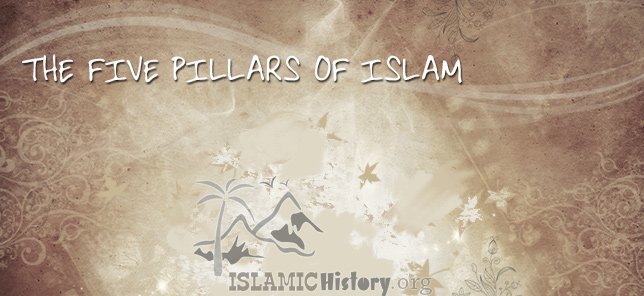Muslims have five key duties they try to carry out. These are called the five pillars of Islam. These five pillars are: bearing witness, fasting, charity, and pilgrimage. These religious disciplines are rooted in the teachings of the Quran and in the example of the Prophet Muhammad [saw].
The Five Pillars of Islam are very important as they are the basis of Muslim life. You enter into Islam by reciting that there is no god but Allah. In addition, all Muslims are to pray five times a day, fast during Ramadan, give annual charity, and make the Hajj, or pilgrimage.
The First Pillar (the Shahada) is believing and saying the words: “ASH-HADU ANLA ELAHA ILLA-ALLAH WA ASH-HADU ANNA MOHAMMADAN RASUL-ALLAH”. The English translation is: “I bear witness that there is no deity (none truely to be worshipped) but, Allah, and I bear witness that Mohammad is the messenger of Allah”. Recitation of this formula is a necessary and also sufficient condition for becoming a Muslim.
The phrase La ilhah ilAllah ( There is no god but Allah ). It urges us to worship Allah alone, to declare that ” Muhammad [saw] is a servant and a Messenger of Allah”
The Second Pillar (Salah) is praying five times a day. prayers are performed at dawn, midday, late afternoon, sunset and nightfall. Muslims may pray alone or in a group as long as they face the Saudi Arabian city of Mecca, Muhammad’s birthplace and the holiest city of Islam. It is common in many predominantly Islamic countries to see Muslims performing the salah wherever they happen to be at the appropriate time. After repeating the prescribed prayer, Muslims may add a personal prayer.
The Third Pillar is giving a certain amount of ones’ savings to help others, such as the poor almsgiving. In Arabic called zakah. Muslims pay a specified amount of money, typically 2.5 percent of one’s accumulated wealth each year, to assist the poor and sick. The money is not to support the mosque or Islamic leaders. The Koran does not say how much should be given. In some Muslim countries, according to Lippman, it is voluntary, while in others, the government enforces it.
the Fourth Pillar is fasting, which is going without food or drink, form dawn to sunset, everyday during the month of Ramadan. Also called sawm, during the month of Ramadan. Because Islam uses a lunar calendar, its year is 11 days shorter than that of the solar calendar governing most worldly affairs. As a result, Ramadan comes 11 days earlier each year. The month is sacred because, as Muslims believe, God first revealed verses of the Koran to Muhammad during Ramadan. During Ramadan, Muslims are to refrain from eating, drinking, smoking and sex from dawn to sunset. Typically during Ramadan, Muslims have breakfast before dawn and do not eat again until after sunset.
The fifth Pillar is making the journey to Mecca, the holist of all places for Muslims. Every Muslim who can afford it is expected to make the journey to Mecca once in their lifetime. Hajj, or pilgrimage to Mecca. Islam requires that every believer make at least one visit to Mecca in a lifetime if physically and financially able to do so. The spectacular hajj now brings together more than two million Muslims in a religious gathering that has continued without interruption for about 1,400 years. Where once pilgrims came on foot or camel, sometimes after more than a year of travel, most now arrive by air. The hajj commemorates the sacrifices, faith and obedience of Abraham; his second wife, Hagar; and their son, Ishmael, at Mecca. According to the Council on Islamic Education, it is the largest, regularly scheduled international gathering on Earth. When the pilgrims arrive, they don special clothing. Men wear two seamless white sheets, and women usually wear a modest white dress and are prohibited from wearing veils or gloves. In this uniform attire, the pilgrims feel that they are equal before the eyes of God and that only virtue and devotion will set one apart from others.

